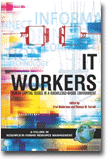
IT Workers Human Capital Issues in a Knowledge Based Environment
Edited by:
Tom Ferratt, University of Dayton
Fred Niederman, St. Louis University
A volume in the series: Research in Human Resource Management. Editor(s): Dianna L. Stone, Universities of New Mexico, Albany, and Virginia Tech. James H. Dulebohn, Michigan State University. Brian Murray, University of Dallas. Kimberly M. Lukaszewski, Wright State University.
Published 2006
The goal of this book is to serve as a gathering of knowledge and ideas at the intersection of the human resource management (HRM) and management information systems (MIS)/information technology (IT) fields. In striving toward achieving this goal we have relied on authors who responded to our call for work within this intersection. As described more fully below, the chapters clustered into four topic areas: (1) effective management of IT workers, (2) IT workers and their careers, (3) diversity in IT, and (4) organizational issues. Thus, this book focuses on selected areas within the intersection of these fields rather than covering the entire intersection. Of course, the broad goal of this book could not be completely fulfilled – and even if it were, such knowledge would be continually overtaken by the ongoing evolution of people, technology, and their interactions. However, in the process of undertaking this project, we have had the opportunity to make some observations about the current state of knowledge regarding IT workers, the human capital that makes it possible for organizations in a knowledge-based economy to plan, create, integrate, operate, and maintain their various IT-based systems.
CONTENTS
Effective Management of IT Professionals. “Validation of Human Resource Strategies in Information Technology”, Ritu Agarwal and Thomas W. Ferratt. “Fire Fighting Gone Wrong: The Overuse Of Reactive Management In IT”, Jo Ellen Moore, Lisa A Burke, and Susan E. Yager, “Retaining IT Personnel: An Integrated Framework”, Mohan Thite. “Agency Theory Implications for Information Systems Project Management”, Robert C. Mahaney and Albert L. Lederer. “The Cognitive Environment Among IT Workers”, Michael A. Chilton. IT Professionals and Their Careers. “Voluntary Turnover Decisions: Reflective Biographies of Information Systems Professionals”, M. Gordon Hunter and Felix B. Tan. “An Examination of Skill Requirements of Information Technology Professionals During the Eighties and the Nineties: The Singapore Context,” Patrick Chang Boon Lee. "We’re Not in Kansas Anymore: Realties of IT Career Management,” Diane Bandow. “Career Orientation of IT Personnel,” Mary Sumner, Susan E. Yager, and Denise Franke. Diversity in IT. “Salary and Age Discrimination of Computer Programmers,” Stuart D. Galup, Ronald Dattero, and Jing ‘Jim’ Quan. “Gender and Career Choice Determinants in Information Systems Professionals: A Comparison with Computer Science,” Manju Ahuja, Chris Ogan, Susan Herring, and Jean C. Robinson. “Managing Diversity or Valuing Diversity?: Gender and the IT Labor Market,” Marie Griffiths, Claire Keogh, Karenza Moore, Angela Tattersall, and Helen Richardson. “Investigating the Existence and Value of Diversity in the Global IT Workforce: An Analytical Framework,” Eileen M. Trauth, Haiyan Huang, Allison Morgan, Jeria L. Quesenberry, and Benjamin Jwee Kiat Yeo. Organizational Issues. “Managing Training in a Technology Context,” Cynthia M. LeRouge and Harold W. Webb. “Do you know where you belong?: Salient Identity Model (SIM) for boundary spanning VTs,” Lionel Robert and Manju Ahuja. “Information Technology Enabled Employee Deviance,” Andrea Hoplight Tapia. “Employment Sharing for IT Micro and Small Business,” Jenine Beekhuyzen, and Sonja Bernhardt. “Establishing the Economic Value of an Information Technology Workforce.” Fred Niederman.
-
Paperback978-1-59311-445-9
Web price: $62.04 (Reg. 72.99)
-
Hardcover978-1-59311-446-6
Web price: $89.24 (Reg. 104.99)
- eBook9781607524892

- BUS083000 - BUSINESS & ECONOMICS: Information Management
- BUS041000 - BUSINESS & ECONOMICS: Management
- COM014000 - COMPUTERS: Computer Science
-
 Diversity and Inclusion in Organizations
Diversity and Inclusion in Organizations
-
 Forgotten Minorities in Organizations
Forgotten Minorities in Organizations
-
 Leadership
Leaders, Followers, and Context
Leadership
Leaders, Followers, and Context
-
 Managing Team Centricity in Modern Organizations
Managing Team Centricity in Modern Organizations
-
 Research Methods in Human Resource Management
Toward Valid Research-Based Inferences
Research Methods in Human Resource Management
Toward Valid Research-Based Inferences
-
 The Only Constant in HRM Today is Change
The Only Constant in HRM Today is Change
-
 The Plight of Stigmatized Groups in Organizations
The Plight of Stigmatized Groups in Organizations

